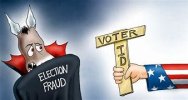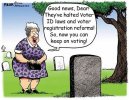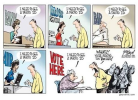mark francis
Well-Known Member
- Joined
- Jan 15, 2021
- Messages
- 17,834
Democrats understand the threat that voter IDs pose to their decades-long practice of voting fraud. They don't care what is right or what the majority of Americans want, they are determined to keep the voting fraud avenues open for them at all costs.
Seaside city resisting state Dems' attempt to force it into 'submission' over voter ID law (msn.com) 4-26-24
Seaside city resisting state Dems' attempt to force it into 'submission' over voter ID law
FOX News
Huntington Beach Mayor slams Newsom voter ID lawsuit: 'Government overreach'
A conservative enclave in Southern California is embroiled in a legal dispute with the state's liberal authorities over its voter ID law that was passed by more than 50% of the city's voters.
Huntington Beach Mayor Gracey Van Der Mark told Fox News Digital the latest lawsuit from Sacramento authorities is just another targeted attack on the city's values.


Rep. Keith Ellison (D-MN) introduced the Voter Access Protection Act (H.R. 4026), which would prohibit election officials from requiring an individual to provide a photo identification as a condition for voting in a federal election.
Seaside city resisting state Dems' attempt to force it into 'submission' over voter ID law (msn.com) 4-26-24
Seaside city resisting state Dems' attempt to force it into 'submission' over voter ID law
FOX News
Huntington Beach Mayor slams Newsom voter ID lawsuit: 'Government overreach'
A conservative enclave in Southern California is embroiled in a legal dispute with the state's liberal authorities over its voter ID law that was passed by more than 50% of the city's voters.
Huntington Beach Mayor Gracey Van Der Mark told Fox News Digital the latest lawsuit from Sacramento authorities is just another targeted attack on the city's values.


Rep. Keith Ellison (D-MN) introduced the Voter Access Protection Act (H.R. 4026), which would prohibit election officials from requiring an individual to provide a photo identification as a condition for voting in a federal election.

